An energizing iron-rich tea mix can be a great way to boost your iron intake during pregnancy. Blend iron-rich herbs like nettle leaf, red raspberry leaf, and dried hibiscus flowers with flavor enhancers such as ginger or peppermint. These teas can help combat pregnancy anemia, increase energy levels, and support your baby's development. Brew your mix using fresh, cold water at about 200°F (93°C) and steep for 3-5 minutes. Aim for 27 mg of iron daily, but remember to consult your healthcare provider before adding new supplements to your diet. There's much more to learn about maximizing the benefits of your pregnancy tea blend.
Understanding Pregnancy Anemia
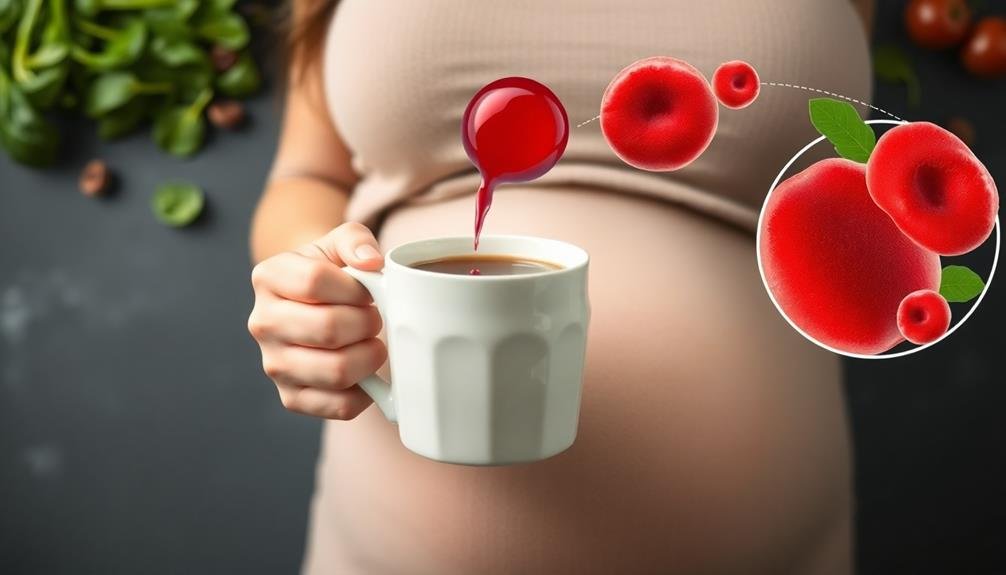
During pregnancy, many women face the challenge of anemia, a condition where the body lacks enough healthy red blood cells to carry oxygen effectively.
As an expectant mother, you're more susceptible to anemia due to the increased blood volume your body produces to support your growing baby. This expansion can dilute your iron levels, leading to a deficiency.
You might experience symptoms like fatigue, weakness, pale skin, and shortness of breath. These signs shouldn't be ignored, as anemia can impact both you and your baby's health. It may increase the risk of preterm delivery, low birth weight, and postpartum depression.
Iron plays a vital role in preventing pregnancy anemia. Your body needs more iron to produce hemoglobin, the protein in red blood cells that carries oxygen.
While prenatal vitamins help, incorporating iron-rich foods into your diet is essential. You'll find iron in lean meats, leafy greens, legumes, and fortified cereals.
However, it's important to pair these with vitamin C-rich foods to enhance iron absorption. If you're concerned about your iron levels, consult your healthcare provider for proper testing and guidance on supplementation.
Benefits of Iron-Rich Herbal Teas
While prenatal vitamins are essential, iron-rich herbal teas offer a soothing and natural way to boost your iron intake during pregnancy. These teas can complement your diet and help prevent anemia, which is common during pregnancy. Iron-rich herbal teas are often more easily absorbed by your body compared to iron supplements, reducing the risk of constipation and other digestive issues.
Drinking these teas can provide numerous benefits for expectant mothers:
- Increased energy levels and reduced fatigue
- Enhanced oxygen delivery to your baby
- Improved immune function
- Better cognitive performance
- Reduced risk of preterm delivery and low birth weight
You'll find that many iron-rich herbal teas also contain other beneficial nutrients and antioxidants. They can help with hydration, which is vital during pregnancy.
Some teas may even alleviate common pregnancy discomforts like nausea and heartburn. Remember to consult your healthcare provider before incorporating new herbal teas into your diet, as some herbs may not be suitable during pregnancy.
When chosen wisely, iron-rich herbal teas can be a delightful and healthful addition to your prenatal care routine.
Key Ingredients for Anemia-Fighting Blend
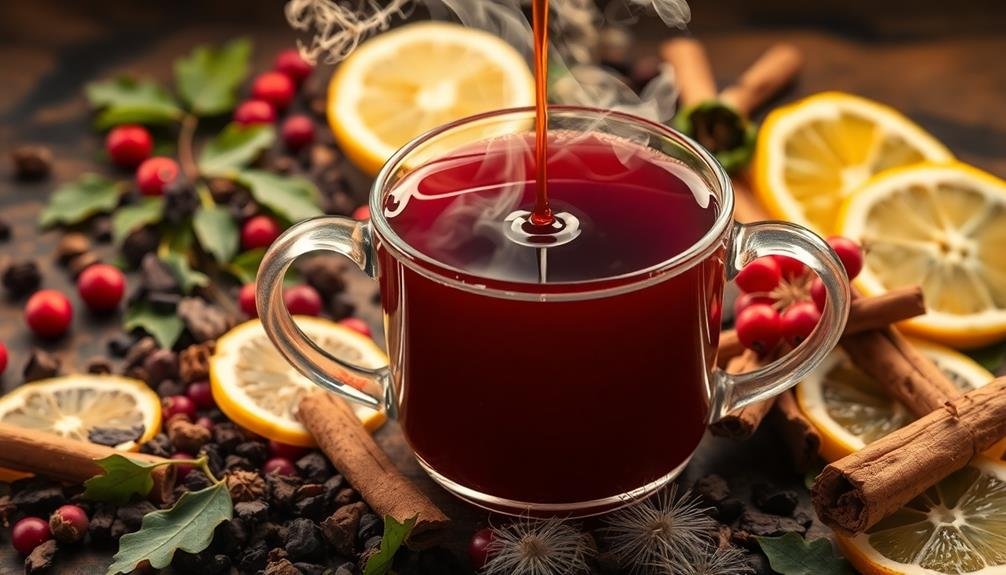
Now that you understand the benefits of iron-rich herbal teas, let's explore the key ingredients that make up an effective anemia-fighting blend.
Your tea mix should include nettle leaf, which is packed with iron and vitamin C to enhance absorption. Add dried hibiscus flowers for their high iron content and tangy flavor. Include red raspberry leaf, known for its iron and other essential minerals.
Don't forget about yellow dock root, a powerful herb that aids in iron absorption and supports liver function. Incorporate dandelion root to boost iron levels and improve digestion.
Lemon peel can enhance the tea's taste while providing vitamin C for better iron absorption. For a touch of sweetness and additional iron, add a small amount of blackstrap molasses.
Consider including moringa leaf powder, which is rich in iron and other nutrients. Finally, add a pinch of ginger root to aid digestion and reduce nausea.
Remember to consult with your healthcare provider before consuming any herbal tea blend during pregnancy. They'll help you determine the right dosage and guarantee the ingredients are safe for your specific needs.
Sourcing High-Quality Herbs
Once you've identified the key ingredients for your iron-rich tea blend, it's crucial to source high-quality herbs. Look for reputable suppliers who specialize in organic, sustainably harvested herbs. These suppliers should provide detailed information about their sourcing practices and quality control measures.
When selecting herbs, prioritize those that are fresh, vibrant in color, and free from any signs of mold or decay. Consider purchasing whole herbs rather than pre-ground options, as they retain their potency and flavor for longer periods. Store your herbs properly in airtight containers away from direct sunlight and moisture to maintain their quality.
Before using any herbs in your tea blend, research their safety for pregnant women and consult with a healthcare professional.
To guarantee you're sourcing high-quality herbs, keep these points in mind:
- Choose certified organic herbs whenever possible
- Verify the supplier's reputation and certifications
- Inspect herbs for freshness and proper drying
- Opt for sustainably harvested wild-crafted herbs when available
- Request third-party lab testing results for purity and potency
Crafting Your Personalized Tea Mix
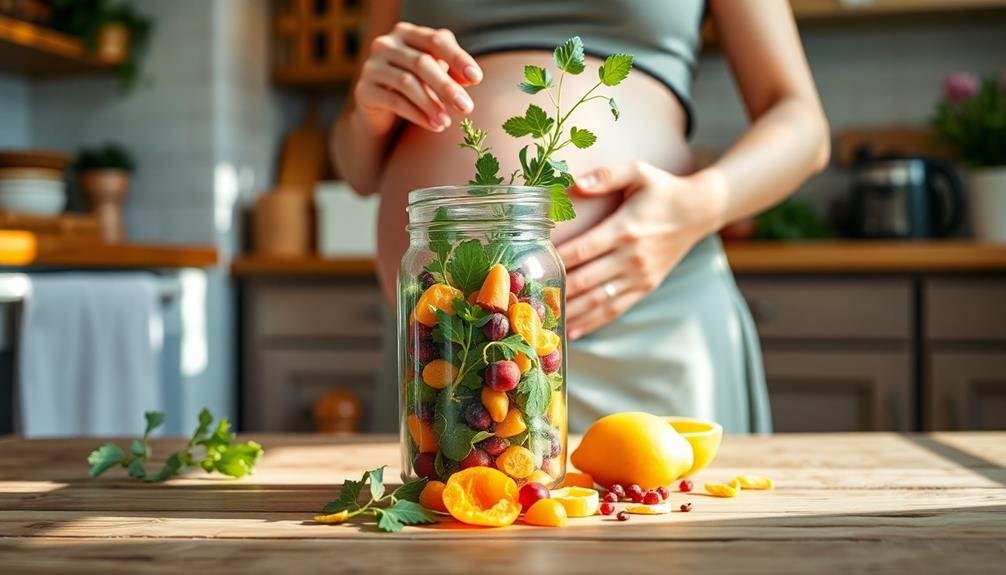
Now that you've gathered your high-quality herbs, it's time to create your personalized tea mix.
Start by selecting your base ingredients, which should include iron-rich herbs like nettle and red raspberry leaf.
You can then enhance the flavor profile by adding complementary herbs such as peppermint, ginger, or lemon balm to suit your taste preferences.
Choose Your Base Ingredients
Crafting your personalized iron-rich tea mix begins with selecting the right base ingredients. You'll want to focus on herbs and teas that are naturally high in iron and other essential nutrients for expectant mothers. Consider incorporating ingredients like nettle leaf, red raspberry leaf, and dandelion root, which are known for their iron content and overall benefits during pregnancy.
When choosing your base ingredients, keep these factors in mind:
- Taste preferences: Select flavors you enjoy to guarantee you'll drink the tea regularly.
- Nutritional value: Prioritize ingredients rich in iron, folic acid, and other pregnancy-supporting nutrients.
- Safety during pregnancy: Verify that all chosen ingredients are safe for expectant mothers.
- Availability: Opt for readily accessible ingredients to maintain a consistent supply.
- Complementary flavors: Combine ingredients that work well together for a pleasant taste.
Remember to consult with your healthcare provider before adding any new herbal teas to your diet during pregnancy. They can help you determine the most suitable ingredients for your specific needs and guarantee that your tea mix aligns with your overall prenatal care plan.
Once you've chosen your base ingredients, you're ready to move on to the next step in creating your personalized iron-rich tea blend.
Add Flavor Enhancers
Flavor-boosting ingredients can transform your iron-rich tea mix from a nutritional necessity to a delightful treat. Consider adding natural sweeteners like stevia or honey to balance any bitterness from the iron-rich herbs. Cinnamon and ginger not only enhance flavor but also offer anti-inflammatory benefits.
For a citrusy kick, incorporate dried lemon or orange peel, which can also aid iron absorption due to their vitamin C content.
Don't overlook the power of florals. Rosehips and hibiscus flowers add a tangy sweetness while boosting vitamin C levels. Lavender and chamomile can provide a soothing element, perfect for relaxation.
If you're craving something more exotic, try adding a pinch of cardamom or star anise for a unique twist.
Remember to use these flavor enhancers sparingly. You don't want to overpower the nutritional benefits of your base ingredients. Start with small amounts and adjust to taste.
It's also wise to consult your healthcare provider before incorporating new herbs, especially during pregnancy. By experimenting with different combinations, you'll create a personalized tea mix that's both nutritious and enjoyable, making it easier to maintain your iron intake throughout your pregnancy.
Brewing Methods for Maximum Benefits
To access the full potential of your iron-rich tea mix, proper brewing methods are essential.
Start by using fresh, cold water to fill your kettle. Bring it to a rolling boil, then let it cool for about 30 seconds before pouring over your tea mixture. This guarantees the water's temperature is around 200°F (93°C), ideal for extracting iron and other nutrients without destroying them.
Steep your tea for 3-5 minutes, depending on your desired strength. Avoid oversteeping, as it can lead to a bitter taste and potentially reduce the tea's benefits.
Once brewed, you can enjoy your tea hot or allow it to cool for a revitalizing iced version.
For maximum iron absorption, consider these tips:
- Drink your tea between meals, not with them
- Add a splash of vitamin C-rich juice to enhance iron absorption
- Use a glass or ceramic mug instead of metal to prevent mineral interactions
- Avoid adding milk, as it can inhibit iron absorption
- Stir your tea well before drinking to evenly distribute the nutrients
Recommended Daily Intake
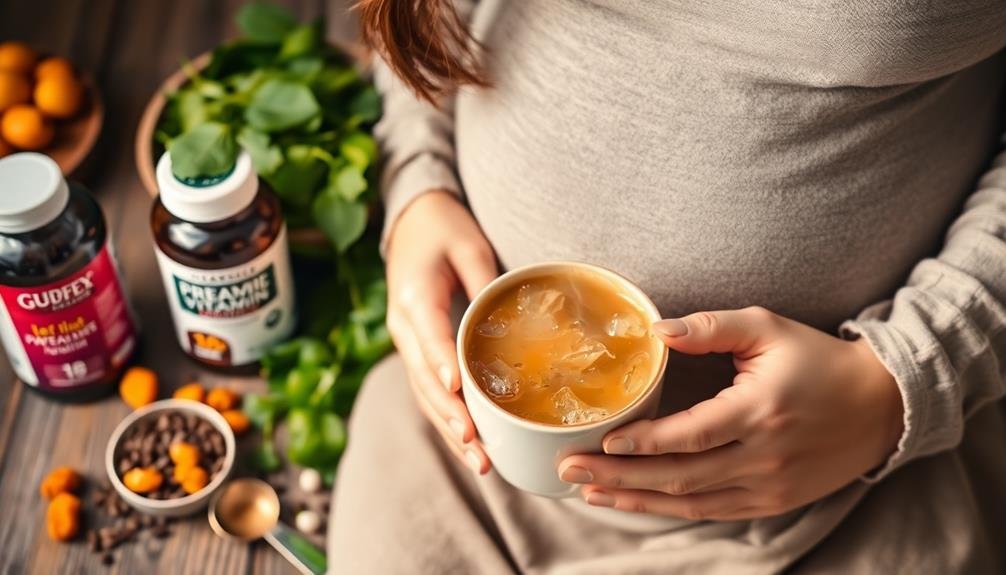
As an expectant mother, you'll need to increase your iron intake to support your growing baby and prevent anemia.
You should consider various factors that affect iron absorption, such as vitamin C intake and timing of consumption, to maximize the benefits of your iron-rich tea mix.
Remember to balance your iron sources between this tea and other dietary options, consulting with your healthcare provider to determine the ideal daily intake for your specific needs.
Iron Needs During Pregnancy
Understanding iron requirements during pregnancy is vital for expectant mothers. Your body needs more iron during this time to support the growing fetus and placenta, and to increase your blood volume.
The recommended daily intake of iron for pregnant women is 27 milligrams, which is nearly double the amount needed by non-pregnant women.
Iron deficiency during pregnancy can lead to various complications, including anemia, preterm birth, and low birth weight. To guarantee you're meeting your iron needs, focus on consuming iron-rich foods and consider taking a prenatal supplement that includes iron.
Here are some key points to remember:
- Your iron needs increase considerably during pregnancy
- Iron is essential for fetal development and preventing maternal anemia
- Aim for 27 milligrams of iron daily
- Combine iron-rich foods with vitamin C to enhance absorption
- Consult your healthcare provider about iron supplementation
It's important to note that while meeting your iron needs is vital, excessive iron intake can be harmful.
Always follow your healthcare provider's recommendations and avoid self-prescribing iron supplements. Regular blood tests can help monitor your iron levels throughout pregnancy.
Factors Affecting Absorption
While meeting the recommended daily iron intake is important, it's equally essential to take into account the factors that affect iron absorption. Your body's ability to absorb iron can vary considerably based on several elements.
The type of iron you consume plays a major role. Heme iron, found in animal sources, is more easily absorbed than non-heme iron from plant sources. If you're vegetarian or vegan, you'll need to pay extra attention to your iron intake and absorption.
Certain foods and drinks can enhance or inhibit iron absorption. Vitamin C-rich foods, like citrus fruits and bell peppers, boost iron absorption when consumed together. On the other hand, calcium, tannins in tea and coffee, and phytates in whole grains can hinder iron uptake. You'll want to time your iron intake accordingly.
Your overall health also impacts absorption. Conditions like celiac disease or inflammatory bowel disorders can reduce your body's ability to absorb iron.
Additionally, pregnancy itself can affect absorption rates, as your body prioritizes nutrient distribution to support fetal development.
Balancing Iron Sources
During pregnancy, you'll need to strike a balance between different iron sources to meet your increased daily requirements. The recommended daily intake of iron for pregnant women is typically 27 mg, which is considerably higher than the 18 mg recommended for non-pregnant women.
To achieve this, you'll want to incorporate a mix of heme and non-heme iron sources into your diet. Heme iron, found in animal products, is more easily absorbed by your body. However, it's important to complement this with non-heme iron sources from plant-based foods.
Your iron-rich tea mix can include a variety of ingredients to help you reach your daily goal. When planning your iron intake, consider these key points:
- Combine heme and non-heme iron sources for ideal absorption
- Include vitamin C-rich foods to enhance non-heme iron absorption
- Be mindful of calcium intake, as it can inhibit iron absorption
- Space out iron supplements and calcium-rich foods by a few hours
- Consult your healthcare provider to determine your specific iron needs
Potential Side Effects and Precautions
Although this iron-rich tea mix offers numerous benefits for expectant mothers, it's crucial to be aware of potential side effects and take necessary precautions. Consuming high amounts of iron can lead to constipation, nausea, and stomach discomfort. If you experience these symptoms, reduce your intake and consult your healthcare provider.
Be cautious if you have a history of hemochromatosis or other iron absorption disorders, as excessive iron intake can be harmful. Always inform your doctor about any supplements you're taking during pregnancy.
Some herbs in the tea mix may interact with medications or have contraindications. For instance, if you're on blood thinners, avoid ingredients like ginger or turmeric. Pregnant women with gestational diabetes should be wary of cinnamon's potential effects on blood sugar levels.
Lastly, while this tea mix can boost iron levels, it shouldn't replace a balanced diet or prescribed prenatal vitamins. Use it as a complementary addition to your nutrition plan.
If you experience any unusual symptoms or have concerns, don't hesitate to seek medical advice. Your health and your baby's well-being should always be the top priority.
Complementary Nutrition for Expectant Mothers

Many expectant mothers find that a well-rounded nutrition plan is essential for a healthy pregnancy. While an iron-rich tea mix can be beneficial, it's important to complement it with other nutrient-dense foods. You'll want to focus on a balanced diet that includes a variety of fruits, vegetables, whole grains, lean proteins, and healthy fats.
To support your pregnancy, consider incorporating these nutrient-rich foods into your daily meals:
- Leafy greens like spinach and kale for folate and iron
- Fatty fish for omega-3 fatty acids and vitamin D
- Greek yogurt for calcium and probiotics
- Legumes for protein and fiber
- Colorful fruits for vitamins and antioxidants
Remember that your body's nutritional needs change during pregnancy. You'll need additional calories, protein, and certain vitamins and minerals.
Consult with your healthcare provider to determine the right balance of nutrients for your specific needs. They may recommend prenatal vitamins to fill any nutritional gaps.
Frequently Asked Questions
Can This Tea Mix Be Consumed by Non-Pregnant Individuals With Anemia?
You can likely consume this tea mix if you're anemic, even if you're not pregnant. It's rich in iron, which may help with your condition. However, it's best to consult your doctor before adding it to your diet.
How Long Does the Prepared Tea Mix Stay Fresh?
Once you've prepared the tea mix, it'll stay fresh for about 24 hours in the refrigerator. Don't keep it longer than that, as it may lose its potency and flavor. It's best to make a fresh batch daily.
Are There Any Alternatives for Those Who Dislike the Taste of Tea?
If you don't like tea, you've got options. You can try fruit smoothies, iron-fortified juices, or herbal infusions. There are also iron supplements in pill form. Always consult your doctor before making dietary changes during pregnancy.
Can This Tea Mix Interfere With Prenatal Vitamin Absorption?
It's possible that certain tea ingredients could interfere with vitamin absorption. You should consult your doctor about potential interactions. To be safe, you might consider taking your prenatal vitamins at a different time than drinking the tea mix.
Is It Safe to Continue Drinking This Tea While Breastfeeding?
While breastfeeding, you should consult your doctor before continuing any herbal teas. They'll assess if it's safe for you and your baby. Some ingredients might affect milk production or be passed through breast milk.
In Summary
You've now got the knowledge to create a powerful iron-rich tea blend tailored for pregnancy. Remember, this tea isn't a substitute for prenatal vitamins or medical advice. Always consult your healthcare provider before adding new herbs to your routine. With careful sourcing, proper brewing, and mindful consumption, you'll be sipping your way to better health. Enjoy your custom blend, but don't forget to pair it with a balanced diet for ideal pregnancy nutrition.

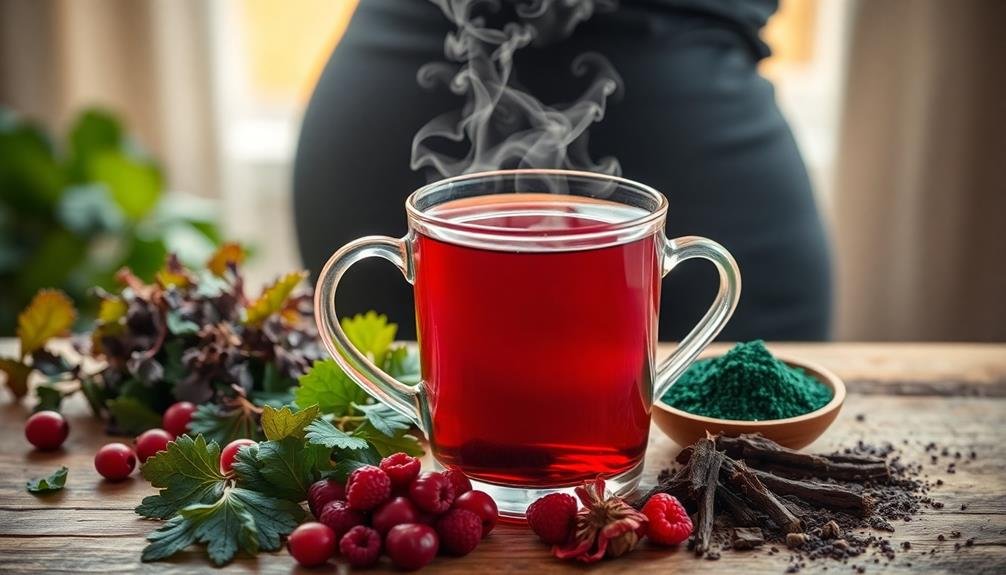



Leave a Reply